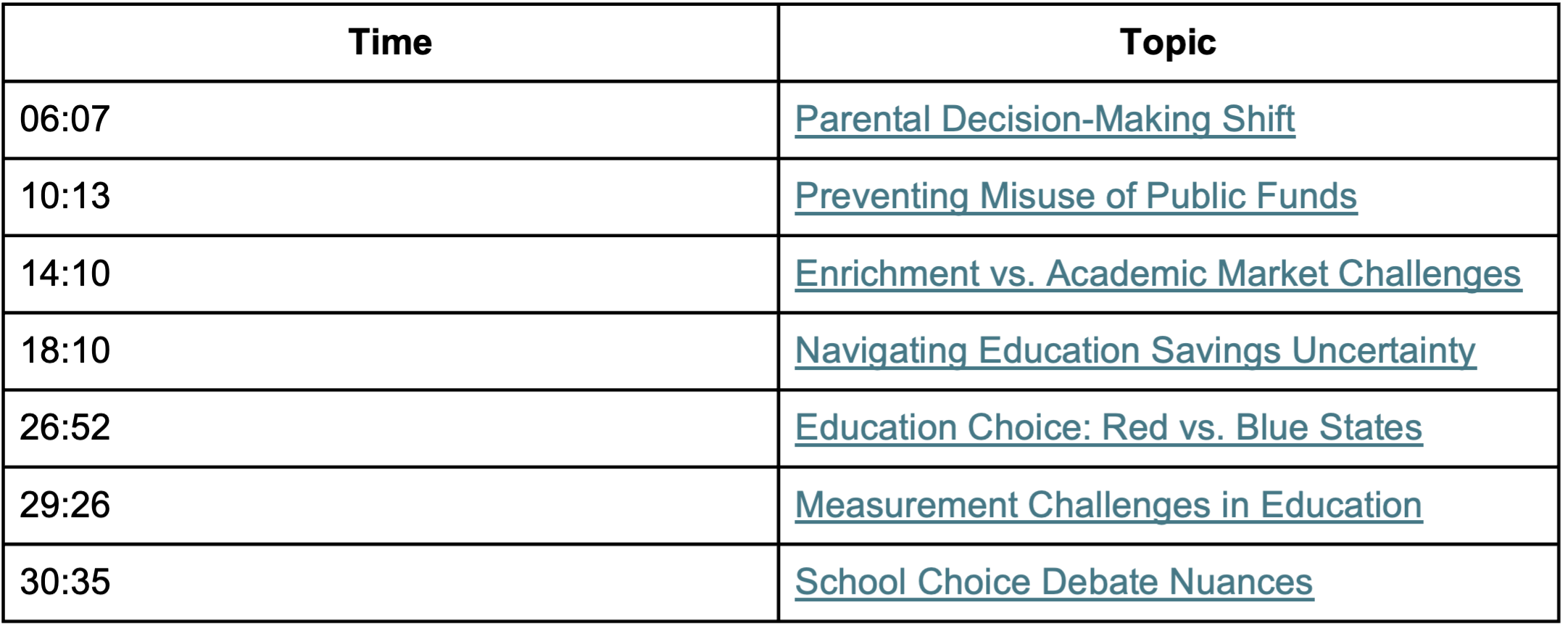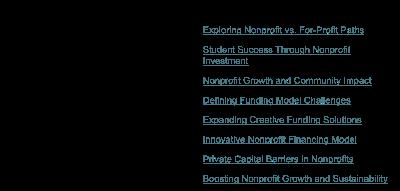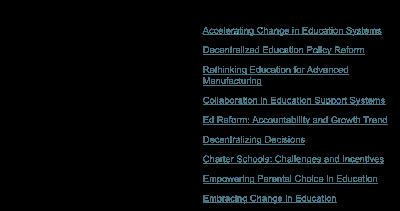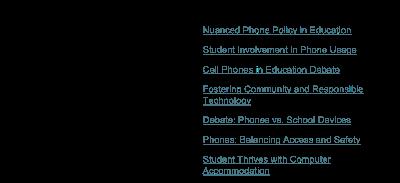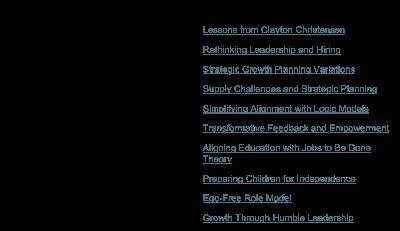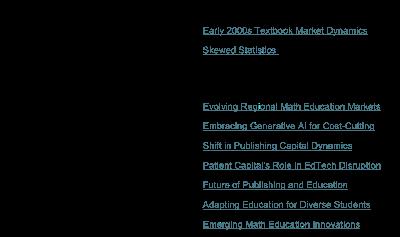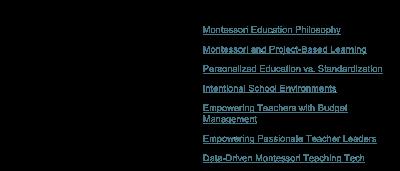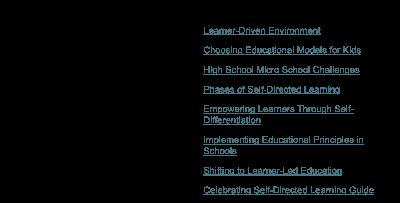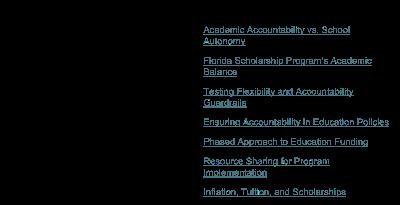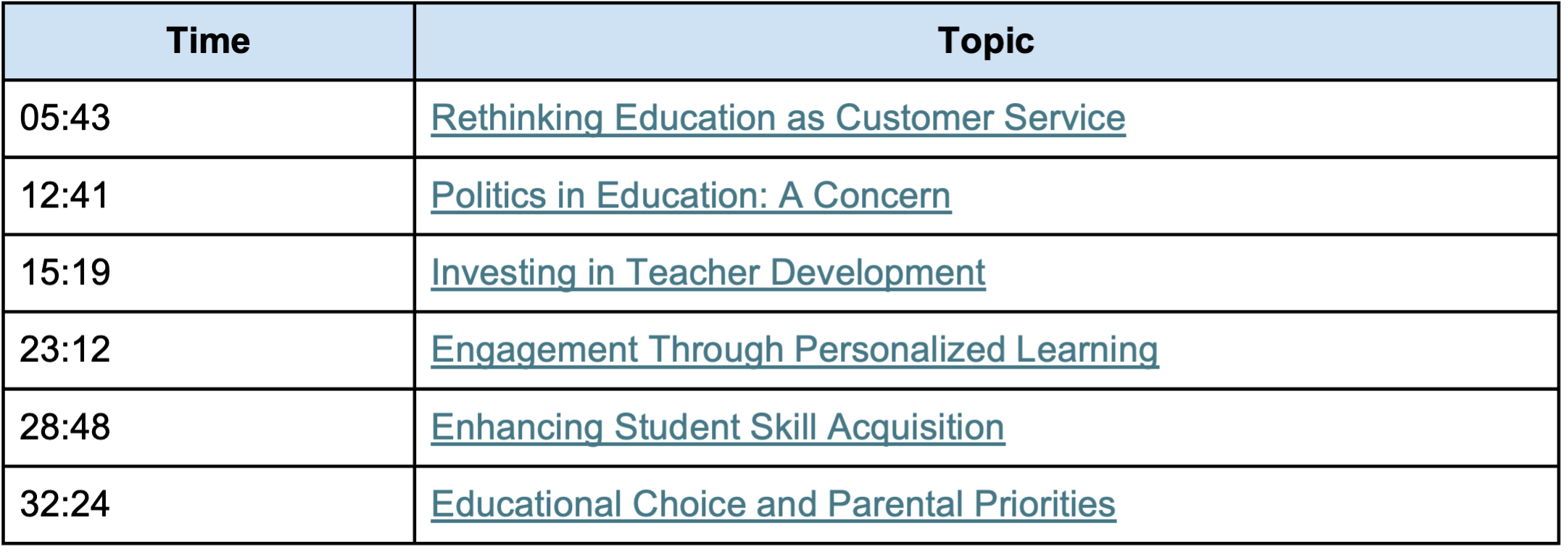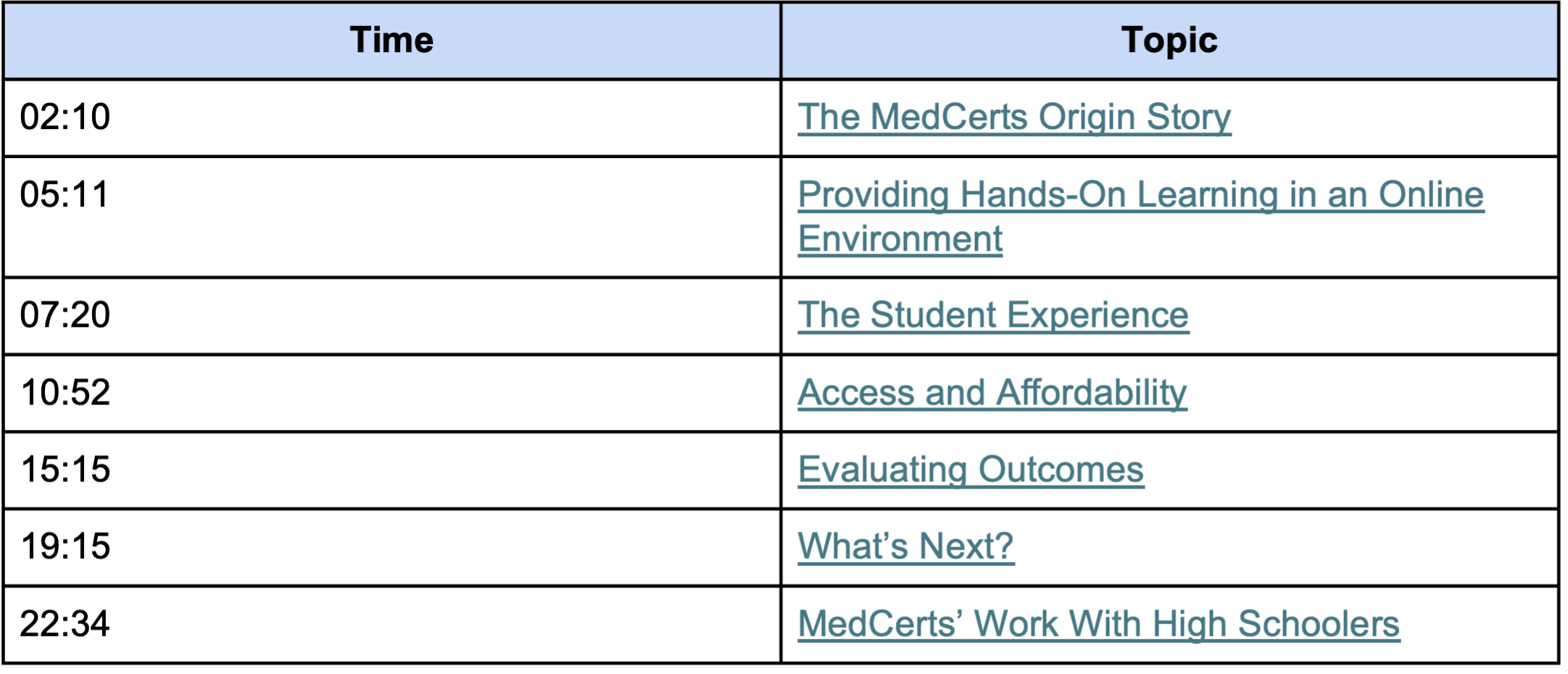Inside the Demand Side of Families Using ESAs
Description
Mike Goldstein joined me to talk about the evolving landscape of education savings accounts (ESAs) and the experiences of families utilizing them. Goldstein, who has been researching the reality for families on the ground in states like Florida and West Virginia, shares insights into how different types of families—those in reactive situations looking to escape traditional schooling and proactive families seeking enrichment opportunities—are navigating this space. The discussion highlights the challenges these families face, such as navigating systems with varying levels of friction and finding appropriate educational resources, and touches on the potential for future innovations in guidance and AI to assist parents in making more informed educational choices for their children.
Michael Horn
Welcome to the Future of Education. I'm Michael Horn. And you are joining the show where we are dedicated to creating a world in which all individuals can build their passions, fulfill their potential, and live lives of purpose. And to help us think through that, today we've got one of my favorite folks in the world of education, if we can call it that, none other than Mike Goldstein. He's a repeat guest now on the podcast. Mike, as many of you may know, founder of MATCH Charter Schools back in the day, did some really interesting work overseas, helping stand up a network of schools in Africa. And we may get into all sorts of things, but in the last several years has really been, Mike, I'm going to say, tinkering with a lot of innovations on the ground around what schooling could look like. And in different realms of the equation of K12 into this thing we think of as college or launching into careers and so forth.
Like, you've been playing a lot in the design and innovation space and thinking about what's the reality on the ground. And then most recently, he's been a fellow at the Pioneer Institute here in Massachusetts. And you got to do a bunch of work, Mike, I guess looking at, let's put it this way, like educational choice, not just even school choice, by a lot of measures, it's growing quite a bit. Education Savings Accounts, universal in many states. Now we can talk about what that means or doesn't mean. You've been looking at, like, what's the reality on the ground for a family trying to figure out, hey, I have $8,000 in a bank account earmarked for education. Where do I spend it? What do I want to use it on? Am I homeschooling, microschooling, unbundling, all these terms we use in education wonk land.
What have you been learning on the ground? Maybe let's start there and we'll see where it takes us.
Mike Goldstein
Yeah, great to be here. Six miles south of you in Watertown, Mass. The weather's unbelievable down here.
Michael Horn
I'm just jealous.
Mike Goldstein
Yes. So listen, great to be here. And yeah, Jim at Pioneer said, hey, we're interested in, like, what are the stories underneath this very fast expanding education savings account. And so I was looking at states like Florida, you know, $8,000 per year per kid. West Virginia, $5,000 per year per kid. And as you know, and probably many of your listeners, your podcast listeners know, the typical family with an education savings account just takes that eight grand and gives it to their local private school. That's how they're using that money. So 90% of the families have a very conventional and easy to understand expenditure here.
It's like, all right, it's either paying my tuition or cross subsidizing my tuition. What's more interesting and wildly varied is if you are a homeschool family and you can take the eight grand or the five grand and spend it without any underlying private school tuition that you have to pay. Right. And so those were some of the stories that I was trying to capture for Pioneer, finding these people, talking to them, how do you blow the money? How's it going for your kid?
Michael Horn
So like these are almost the blank slate families, right? They're not enrolled already in a previous tuition driven school of some sort. It sounds right. Like they're sort of coming into this with a much more blue sky. What do we use this on? And perhaps intentionality of why they want to use it or what they're trying to escape from or whatever else. Is that fair?
Mike Goldstein
I'll give you, I'll share two kind of concrete stories that will resonate, I'm sure with you and your listeners. So you know Daniella in Arizona, Katie and Tiffany in West Virginia. These are classic aspirin, meaning we feel pain as moms. Our kids were enrolled in the public schools and it wasn't going well. I had this mama bear moment. I pulled them out. And so in that case, they're responding to I'm a homeschooler, not for a religious reason, but because I don't feel my kids needs were being met. And sometimes the critique is more social, like kids being bullied, doesn't have friends, doesn't like to go to school.
Sometimes the critique is more academic. My kids are struggling to learn stuff where I don't even think the school is serving even their median kid well. And so then they're like, I gotta figure out how to do this on my own. That's one type. So that was one part of the story. The other was what I would more say are vitamin parents, meaning their kids. So Mariana and Andrena are twins. They came to the US from Venezuela.
They're moms, they live near each other, they each have a few kids. Their kids were doing fine in public school in Florida. It's just that they're like, our kids are little. I think we could do better. Like what if we homeschool our kids and then we can use these education savings accounts much more for enrichment, you know, like, let's get them some bass guitar lessons. Like, my kid wants to do the rock climbing gym, and my other kid's really into soccer at an elite level. Like, we could send them to the academy with some of this cash. And so those are, like, the two types of stories that I think are likely to increase those choosing homeschool over time.
Because it's not like a moral or religious driver of homeschool attendance. It's much more of a vitamin or aspirin to a secular education experience.
Parental Decision-Making Shift
Michael Horn
So both of those are interesting. I think the first is probably more. I don't know, familiar is the right word, but what people might expect, right? Like, my kid's in trouble. This is going nowhere fast. I gotta get out, put an array of services around them. The second one sounds like maybe I'm gonna stereotype in a different way, but like a complacent, previously complacent family that all of a sudden says, hey, we could do something different here and get a lot more for our kids. Maybe let's tackle that one first and, like, tell us what that decision making looks like. What did you learn about how they're making choices? You just said they can spend money on soccer academies and bass guitar lessons.
I mean, those sound fun. I'd like public funding for that for me. What does that look like? What's the conversation at the dining room table like for them?
Mike Goldstein
So I think they were kind of. It's like two sisters evangelized a little by the third sister, this kind of like, hey, we can do this. And I think they're both professional. They're themselves well educated. And some of the vibe here, Michael, was, hey, I'm already, like, working from home, and my Saturdays and Sundays with my kids are pretty pleasant. These are kids with, like, pretty high executive function overall. If you kind of get them started, you know, they're age appropriate.
I mean, these were younger kids, but, like, you know, they get started with their book, and they can read for a while, and they get started with the math, and they can, you know, take a run at it or, you know, just kind of go to mom or dad with like, I need a little help here or there. So not sort of saying it's, like, easy per se,
Michael Horn
but it's not like an all hands on deck. I have to be babysitting my kid.
Mike Goldstein
Yes.
Michael Horn
Eight hours. Right. Totally pulling them tooth and nail through this.
Mike Goldstein
Right. And I think that Covid, of course, sort of woke people up a little bit. This what you were calling, like, a complacent family. It's like the kids are doing fine in school, we got no complaints. They're like reasonably happy to go to school and they have high grades on their report cards. They're liked, they have friends. But it's like, huh, this is like a big chunk of childhood that's pretty boring. It's like, why does this need to go from 8 to 2:30 when I feel like we're getting this roughly done from 9 to 11 am and sort of like they're actually learning a little more, you know, much more compressed time and therefore whether the kid is converting the afternoon just into like let's ride our bike and play outside with our friends, parents are
Michael Horn
Like that's good. Or let's kind of go deeper on more structured kind of enrichment type things. That's good too.
How do they make choices with the money? Right? Like I'm really interested in how social networks play a role in helping them inform. Are there tools though also in the ESA, you know, world that is helping inform them? Like how are they deciding and choosing where they're spending the dollars versus using their own expertise perhaps and so forth. What does that look like?
Mike Goldstein
It's an interesting kind of mess that varies a lot state by state. So this is, it's a pretty fraught area. So each st

